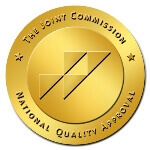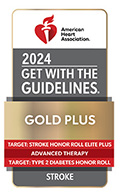The Stroke Center
at Robert Wood Johnson University Hospital
If you experience any stroke warning signs or recognize them in someone else - don't delay. DIAL 911 immediately. Treatment can be more effective if given quickly. Every second counts.
Strokes are the nation's fifth leading cause of death and the leading cause of disability. There are two types of strokes:
- Ischemic stroke: interruption of blood flow caused by a clot
- Hemorrhagic stroke: blood vessel ruptures, causing blood to leak into the brain
Stroke damage can be minimized and even reversed depending on how soon you get help. Both the treatment and where you choose to receive care can lead to better overall outcomes and recovery after stroke. Like a heart attack, a stroke is a medical emergency and every second counts!
About the Stroke Center
The designated Stroke Center at RWJUH provides patients with rapid diagnosis and treatment, specialized inpatient care, access to clinical research through our relationship with Rutgers Robert Wood Johnson Medical School, discharge planning, and post-hospitalization follow-up care. Our accreditations and awards include:



RWJUH Stroke Center Awards
The Joint Commission Disease-Specific Care Comprehensive Stroke Center Certification
The Stroke Center at Robert Wood Johnson University Hospital has been recognized by The Joint Commission and the American Heart Association as meeting The Joint Commission's standards for Disease-Specific Care Comprehensive Stroke Center Certification, which means it is part of an elite group of providers focused on complex stroke care. Comprehensive Stroke Centers are recognized as industry leaders and are responsible for setting the national agenda in highly specialized stroke care.
The AHA Gold Plus Award
The American Heart Association recognizes this hospital for achieving an aggressive goal of treating patients with 85 percent or higher compliance to core standard levels of care as outlined by the American Heart Association for two consecutive calendar years. In addition, this hospital has demonstrated 75 percent or higher compliance with 4 of 7 Get With The Guidelines®-Stroke Quality Measures to improve quality of patient care and outcomes during the 12-month period of assessment.
Target Stroke Honor Roll Elite Plus Status
This award recognizes that over the most recent 12-month review period, at least 75 percent of all eligible ischemic stroke patients at Robert Wood Johnson University Hospital received the important clot-busting drug known as intravenous recombinant tissue plasminogen activator (tPA) within 45 minutes of arriving at the hospital, and more than half of ischemic stroke patients are treated within 30 minutes.
Advanced Therapy Honor Roll
This award recognizes that for patients who are eligible for mechanical intervention, more than half of stroke patients are treated with endovascular therapy (such as the removal of a blood clot) within 90 minutes of ED arrival. More than half of patients who are transferred from another hospital are treated within an hour.
Diabetes Honor Roll
This award recognizes that RWJUH meets 90% compliance for 12 consecutive months for all required measures which aims to ensure patients with type 2 diabetes receive the most up-to-date, evidence-based care when hospitalized with Stroke.
The Stroke Center's 2023 Performance and Quality Measures
American Heart Association Get with the Guidelines Quality Improvement
Program Reporting
Services We Provide
- Multidisciplinary team consisting of neurologists, a neurointensivist, emergency medicine physicians, neurosurgeons, radiologists, speech pathologists, physical therapists, nurses, social workers, pharmacists, occupational therapists, EMTs and paramedics all trained in stroke care
- Code Stroke Response Team, accessible 24-hours-a-day, seven-days-a-week in the Emergency Department, able to quickly diagnose and treat stroke; the team also includes a radiologist, a neuroradiologist, CT technicians and a pharmacist
- Neuroradiologists, interventional neuroradiologists and neurosurgeons are available 24 hours a day, seven days a week
- Rapid administration of a clot-busting drug for acute ischemic stroke
- Endovascular approaches such as carotid stenting, intracranial stenting, angioplasty, aneurysm coiling and flow-diverting stents for aneurysm treatment
- 29-bed stroke unit equipped with monitoring telemetry and step-down beds
- On-site rehabilitation department
- Nursing staff specially trained in providing care for ischemic and hemorrhagic stroke
- Round-the-clock neuroimaging technology; latest diagnostic technology including rapidly available computer tomography (CT), magnetic resonance imaging (MRI), PET, SPECT, conventional angiography, ultrasound, transcranial Doppler, and neurointervention
- Ongoing educational services for all levels of health care professionals
- Research — Clinicians in the Stroke Center are active in ongoing clinical research and collaborate with scientists from many and varied disciplines to determine why strokes occur, who is at risk for stroke, how best to diagnose and evaluate a stroke patient, what is the best management and how can recovery be stimulated
Support Groups
NJ Brain Aneurysm and AVM Support Group
Patients with brain aneurysms and their family members can meet with their peers and participate in open discussions on managing daily activities including:
- Healthy living
- Faith and spiritual healing
- Nutrition and exercise
This is also your opportunity to reconnect with your caregivers from EMS/911 operators to Emergency Department staff, physicians and nurses.
The group meets virtually on the first Wednesday of the month of alternate months at 2 p.m.
For more information, visit the New Jersey Brain Aneurysm and AVM Support Group online. To register for these free virtual meetings, email Sandia Royal at BASG@rwjbh.org. You will be sent a GoToMeeting link via email prior to the next meeting. For questions, please contact the Community Education Department at (732) 937-8820.
True Life After Stroke Support Group
Stroke survivors, their families and caregivers are invited to join our monthly virtual Stroke Support Group meetings. Our multidisciplinary Stroke Center Team will provide education, social and interactive activities and answer your questions.
The group meets virtually on the third Thursday of every month at 2 p.m.
For more information, visit the True Life After Stroke Support Group online. To register to attend the free virtual meetings, email stroke@RWJBH.org. We will email the GoToMeeting login information to you before the next meeting. For questions, please contact the Community Education Department at (732) 937-8820.
American Heart Association Support Network
The American Stroke Association provides several fora for survivors of different types of strokes to connect. It also has a location finder to help you find support groups near you.
Community Stroke Education
The American Heart Association is dedicated to prevention, diagnosis and treatment to save lives from stroke. It funds scientific research, helps people better understand and avoid stroke, encourages government support, guides health care professionals and provides information to enhance the quality of life for stroke survivors. It is a division of the American Heart Association.
Bridgewater Man Saved by Co-Worker and Stroke Campaign
Read about how a stroke education campaign and telestroke technology at Robert Wood Johnson University Hospital (RWJUH) helped save the life of Bridgewater resident Mark Czajkowski. Ron Walker, a construction supervisor at RWJUH, shares his amazing story about how stroke awareness signs displayed near hospital elevators helped him recognize that Mark was having a stroke when he attempted to call in sick one day. The quick action of Ron and Mark’s wife helped save Mark’s life.
Stroke Awareness
Featuring Dr. Gaurav Gupta, Director, Cerebrovascular and Endovascular Neurosurgery at Robert Wood Johnson University Hospital and Rutgers Robert Wood Johnson Medical School
Stroke Research Continues to Revolutionize Treatment Options
Featuring Dr. Igor Rybinnik, Vascular Neurologist at Robert Wood Johnson University Hospital and Associate Professor at the Department of Neurology Division of Stroke and Neurocritical care at Rutgers Robert Wood Johnson Medical School

